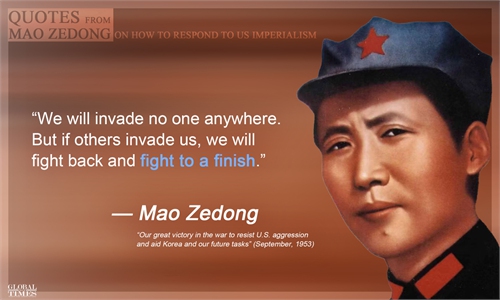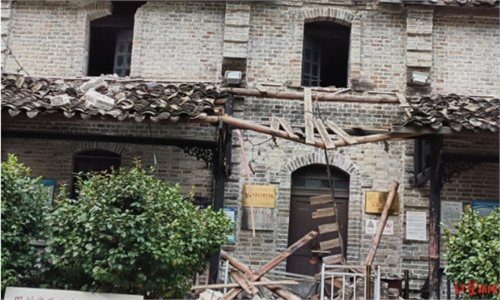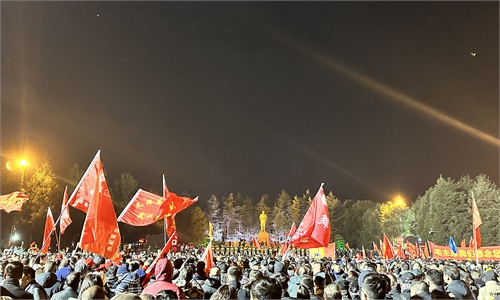ARTS / CULTURE & LEISURE
Documentary on late Chinese leader Mao Zedong achieves balance between historical fact and artistic expression
Long live the people
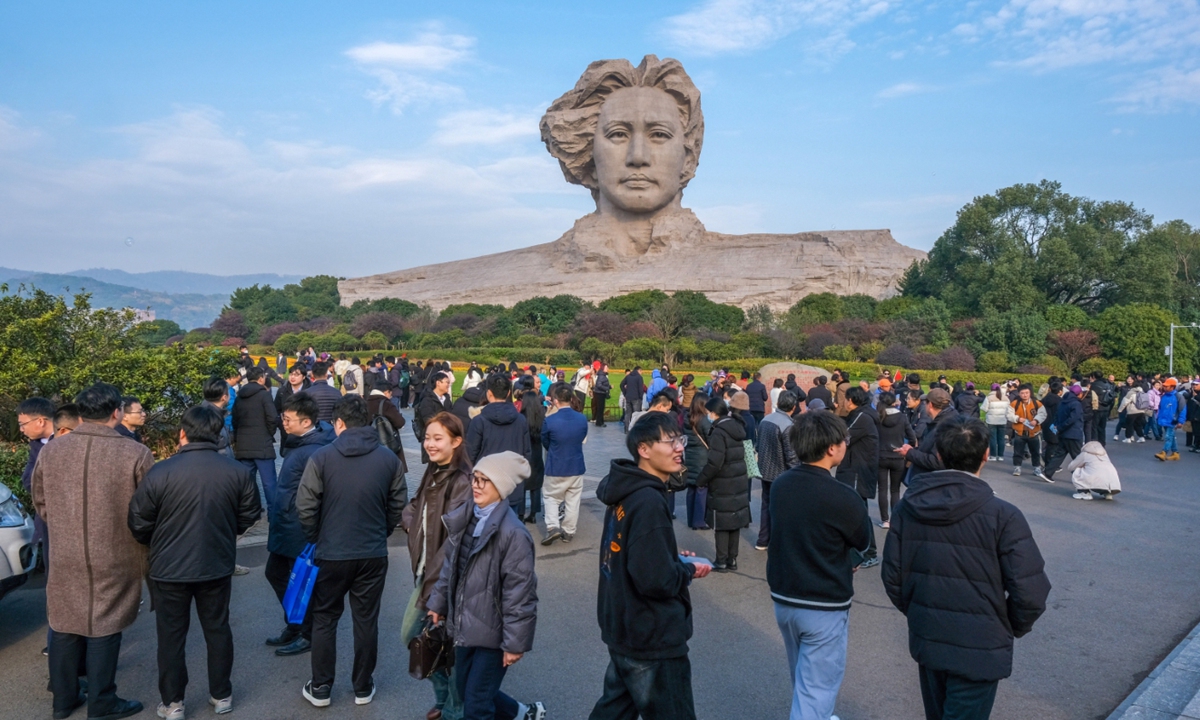
Tourists visit the Juzizhou scenic spot, where a stone statue of late Chinese leader Mao Zedong in his youth stands, in Changsha, Central China's Hunan Province on January 4, 2024. Photo: VCG
It was rainy but warm as the sun, from time to time, shone on a school in Shaoshan, Central China's Hunan Province, where late Chinese leader Mao Zedong was born 130 years ago.
Eleven-year-old student Zhang Chu (pseudonym), together with hundreds of his schoolmates waited outside the school on Friday afternoon for a public screening of a new documentary about the beloved late leader Chairman Mao, who lived in the town until he left for the first time at the age of 17.
December 26, 2023 marked the 130th anniversary of the birth of Chairman Mao and commemorations were held across the country, a part of which was the documentary Long Live the People by director Hao Yun.
With classic images and evocative documentary video clips, it presents a historical picture of stories and emotions shared between Comrade Mao Zedong and the Chinese people, demonstrating the vow of "Long Live the People."
These precious shots "show the deep emotional connection between Chairman Mao and the people, achieving a balance and blend of historical fact and artistic expression," the director told the Global Times. The public screening in Shaoshan is "so meaningful as Shaoshan witnessed the glorious journey of Comrade Mao's birth, growth, study, and revolutionary practice."
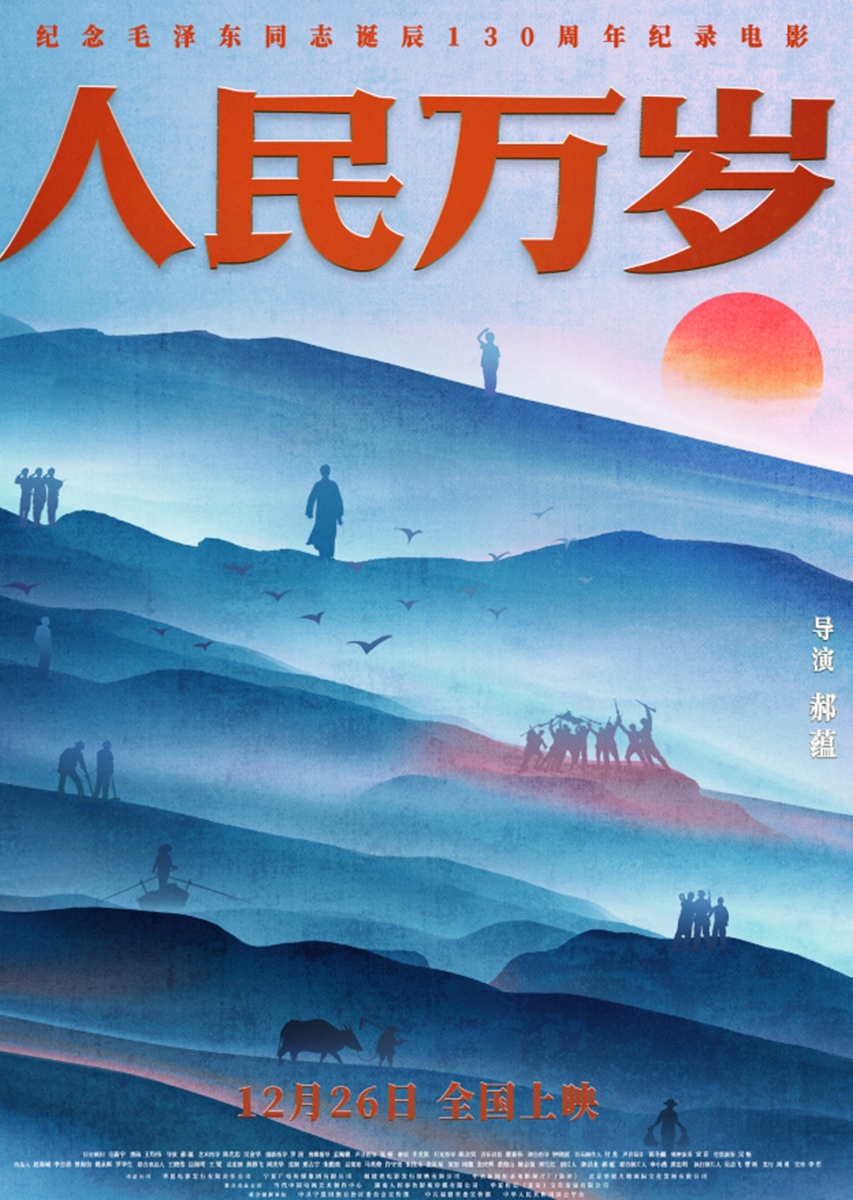
Promotional material for Long Live the People Photo: Courtesy of Huaxia Film Distribution
'A touching work'According to the director, many of the image materials featured in the documentary are not only being presented on the big screen for the very first time, but have also been exquisitely restored by modern technology. "I hope that the amiable image of Comrade Mao and the people sharing weal and woe can be vividly presented," said the director.
The documentary is not only "a vivid record of Comrade Mao's life, but also a touching work that depicts his flesh-and-blood and heart-to-heart ties with the people."
"His heroic ambitions and deep affection are all reflected in the film. Through the warm historical scenes in the movie, the audience will personally feel Comrade Mao's sincere and deep emotions toward the people in that era of stirring ideals and beliefs," she noted.
Perspective of the young
There have been documentaries and feature films about Comrade Mao in the past, but this is the first time that Mao has been shown from the people's perspective.
Producer Chen Changye said that it is a mainstream movie about Comrade Mao's view of the people, so the selection of images aims to show the relationship between Mao and the people as "we can see people's smiling faces as well as the interpretation of his classic motto of 'Serve the People.'"
For instance, the directorial team introduced three young people, who, together with other Vloggers, popularize stories and studies about Chairman Mao on China's streaming and social media platforms like Bilibili and Douyin.
Many young Chinese people are very actively working on videos about Chairman Mao's stories and thought, and promoting them on various platforms. When mentioning Chairman Mao, they prefer to call him Teacher Mao, as he worked as a teacher in his early life.
Their interpretations and videos have been included in the movie as a way to show respect and understanding from young people.
One of the highlights is about Chairman Mao's military talents through his first encounter with troops at the age of 24. With only a few hundred students and local police officers, they successfully defeated 3,000 soldiers and protected the city of Changsha.
Several short stories featured in the movie have touched the audiences during public screenings across the country including at Peking University and in the Ningxia Hui Autonomous Region.
For Mao Min, deputy director of the Shaoshan Special Branch History Exhibition Hall of the Communist Party of China, the movie connects so much of what is remembered about Chairman Mao and his story that she had introduced thousands of times to audiences as a narrator at the hall.
For the Shaoshan local born in 1945, Mao Yushi, the documentary has increased his respect and deep feeling for Chairman Mao as he had the chance to take a group photo with the beloved leader as a young boy when Mao visited the Shaoshan School on June 26, 1959.
After the screening was over, young Zhang and his peers were still immersed in the movie, recalling the memories of Chairman Mao and how he was always connected to the people.

